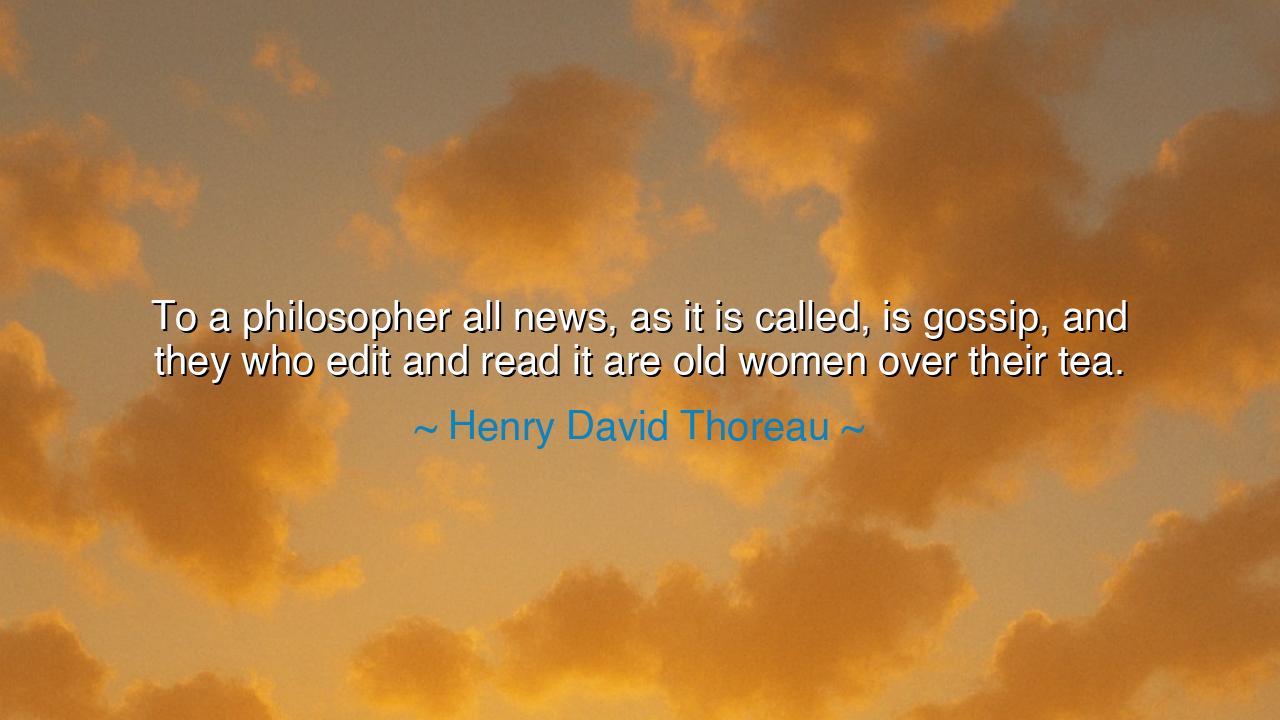
To a philosopher all news, as it is called, is gossip, and they
To a philosopher all news, as it is called, is gossip, and they who edit and read it are old women over their tea.






The words of Henry David Thoreau, ever the hermit-philosopher of Walden Pond, cut through the clamor of the world: “To a philosopher all news, as it is called, is gossip, and they who edit and read it are old women over their tea.” With this saying, he reminds us that much of what men call news is but fleeting chatter, void of substance, endlessly consumed yet seldom nourishing. The philosopher seeks truth eternal, not the shallow ripples of daily rumor. For wisdom dwells in the roots of life, while gossip dances on its surface like foam upon the sea.
The ancients, too, saw this divide. Heraclitus spoke of the masses as sleepers, content with appearances, while the wise sought the hidden fire. To such minds, the endless cycle of “news” is but a distraction from the eternal laws of nature and the soul. Thoreau, echoing this wisdom, mocked the obsession of his age—and by reflection, ours—with headlines that change each dawn, while the deeper questions of life remain neglected. The philosopher asks: what is justice, what is virtue, what is the good life? And in comparison, what weight do rumors of court or marketplace carry?
Consider the life of Socrates, who dwelt not on the daily gossip of Athens, but on the immortal questions of the spirit. While others debated trivial events in the Agora, he questioned the nature of truth, the essence of courage, the meaning of justice. He was condemned, not because he lacked knowledge of “news,” but because his wisdom revealed how empty such matters were. His death stands as proof that the philosopher’s gaze pierces deeper than the fleeting chatter of his time.
Thoreau himself lived this principle. While others devoured newspapers filled with wars, scandals, and political feuds, he withdrew to the woods of Concord, where the rising sun, the call of a bird, or the stillness of the pond spoke more truth than a hundred printed sheets. To him, gossip was not merely idle—it was the great thief of attention, stealing men away from reflection, from nature, from their own souls.
Let the generations remember: the world will always offer its ceaseless stream of news, but the wise must discern its worth. What is today’s rumor will be tomorrow’s forgotten line. Seek, instead, the truths that do not age: justice, virtue, beauty, and the harmony of the soul with the eternal. For those who spend their lives in gossip will vanish like smoke, but those who seek wisdom will leave behind a flame that never dies.






NNDang Nguyen Nguyen
Thoreau’s view of news as gossip is an interesting one. He seems to dismiss the value of daily news, perhaps pointing out its ephemeral nature and lack of substance. But is there a place for this kind of casual chatter in a world where information moves at lightning speed? Or is Thoreau right to suggest that news could be more meaningful if it weren’t just fodder for idle conversation?
SN9-4.33.Nguyen the Song nguyen
This quote by Thoreau almost feels like an early commentary on the modern media landscape, where news often lacks depth and is more about entertainment. Does news really serve its purpose in educating society, or has it become something more akin to gossip, where the focus is on scandal and sensationalism? Is there a way to find balance, or is news inevitably tied to these superficial elements?
PDPatrick Daniel
Thoreau’s comparison of news consumption to gossip is thought-provoking. While it may have seemed true in his time, does it still apply today? In a world where news is often fast-paced and driven by clickbait, are we truly consuming meaningful information, or are we just gossiping in a more structured format? Can we reclaim news as a source of knowledge rather than idle chatter, or is that too idealistic?
THLe Phan Thanh Huong
Thoreau’s quote is a sharp critique of the way society consumes news, equating it to gossip. He seems to suggest that the constant influx of news lacks deeper meaning and is mostly about idle chatter. Is this a valid critique in today’s age, where information is often superficial and sensationalized? Or, do we need news as a tool to stay connected and informed about the world around us, even if it can sometimes feel trivial?